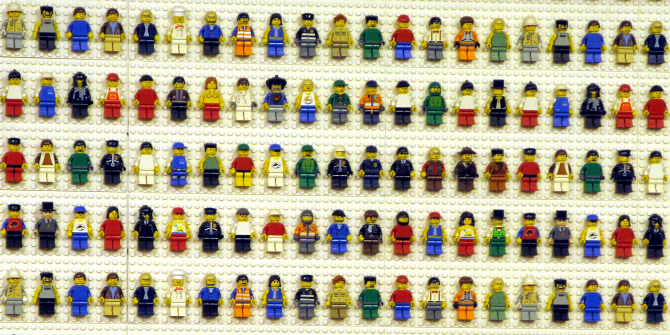David Nicholas discusses the challenges facing early career researchers as a result of the pandemic and outlines how a new longitudinal, qualitative study involving 160 Early Career Researchers (ECRs) from 8 countries will seek to understand how they fare over the next two years.
In something of an oxymoron, we often look to new generations to bring about change, to innovate, indeed, to transform the established system, whilst concurrently – and contradictorily – expecting them to toe the well-trodden line. This is nowhere more pronounced than in the scholarly world, where early career researchers (ECRs) are expected to be highly innovative with regards to research transparency, sharing and equity, but are at the same time required to work within institutions that remain conservative in recognising only traditionally defined research practices and excellence.
Add to these issues the COVID-19 pandemic, which has alternately led some to predict a dearth of opportunities for ECRs and the potential for a ‘lost generation’ of scholars, who leave little mark on the wider practices of academia. Or in contrast, that it has hastened a revolution in scholarship, empowering history’s first ‘always connected’ generation to usher in an era of, collaborative, interconnected, open and faster research. Will ECRs be compelled by the pandemic to remain trapped in the hamster wheel of dated practices and habits endorsed by supervisors and senior colleagues? Or will they break this chain to forge a new kind of scholarship?
What we have learnt from four years studying the drivers and mind-set of ECRs, as part of the Harbingers project, is that the latter may well be the case. Especially so, if the pandemic represents a turning point for research policy. One that highlights the importance of research and collaboration, and spurs long-term support, much as the Second World War did in the second half of the twentieth century. In so doing presenting new opportunities for ECRs to change the system from above, on the policy-making level, but also from within.
Will ECRs be compelled by the pandemic to remain trapped in the hamster wheel of dated practices and habits endorsed by supervisors and senior colleagues? Or will they break this chain to forge a new kind of scholarship?
This is not to say COVID-19 has not surfaced many real issues. Hiring freezes, contract cuts, overall diminished funding have made academia an even more uncertain career. Further, ECRs worry their future prospects are limited by increased workloads and reduced productivity, as a result of having to undertake time-consuming remote teaching and greater responsibilities associated with working from home, such as providing childcare (largely falling on women). There is a clear danger for this generation of ECRs to be left behind.
To address these questions, we are continuing the Harbingers study for an additional two years. We shall not only examine what is going on now, but also plot what happens in what we anticipate will be two significant years for research culture overall. Drawing on our previous work and that of others, we see the following topics as warranting special attention in this period:
Have perceptions of open science changed in the wake of the pandemic, which saw the provision of open access (OA) to COVID-19 research papers and experiments in speedier and more efficient peer review? What role have ECRs played in these developments: have their data/publications been among those made OA, have they decided to opt for OA publishing on their own initiative and have they participated in novel peer reviewing processes? How instrumental do they consider their preferences/values have been in developments in these directions if and when they occurred?
Has the practice of researchers’ using pre-print servers to disseminate more quickly papers relevant to COVID-19 spread to areas not directly related to the pandemic? Have ECRs adopted the practice, and if so, was it on their own initiative? What were their reasons/purposes in doing so? To what extent do they see pre-print servers taking the place of journals? Will this rejuvenated mode of research dissemination breathe new life into these platforms and/or possibly into alternative publishing platforms, too? Has researchers’ free access to pandemic-related research in progress and to related social media debates among peers, politicians and citizens brought about a change in their attitude to altmetrics? How useful do ECRs consider the ability to witness scientific activity in real time?
What are the consequences of bans on international travel, face to face meetings and the greater use of social media platforms and video conferencing for inexperienced and less well-connected ECRs? How has this impacted their collaboration, co-operation and networking opportunities? How have remote working and social distancing affected field/laboratory research? How have safety considerations impacted upon research work? What generally has been the experience of working from home for ECRs, and particularly for women? How did they organise their life and work?
Have ECRs’ status and roles as the ‘workhorses’ of research changed as a result of financial problems and reorganisations undertaken at HE institutions? Has the pressure on them to publish as much as possible as quickly as possible accelerated because of the competition for the reduced number of tenure track positions or, conversely, has it become somewhat diminished with tenure clock extensions put in place at many universities? Has the greater emphasis on the need to reach out to the community to explain COVID-19 related scholarly information influenced their views and activities?
Has the pandemic hindered or accelerated scholarly communication and, in result, scientific progress? Has it changed the focus from international to national interests in order to solve the economic problems during the pandemic and in its aftermath? If so, how have researchers experienced this change in pace/focus and what advantages, or disadvantages, do they see in this state of affairs? Are there any that are thought to have impacts which are more specific to ECRs than to other cohorts? With more money going to medicine and the biological sciences from a possibly shrinking research pot, are there disciplinary losers and winners?
How do the scholarly systems of different countries fare and deal with the demands put upon them by the pandemic? How do ECRs of different international backgrounds fare in result? Have the rich become richer and the poor even poorer? How have international collaborations been affected? What lessons can be learnt from different national/institutional policies aimed at warding off the danger of the present-day cohort of ECRs being rendered a ‘lost generation’. Where, in these circumstances, do ‘best practices’ lie?
Finally, and importantly, the longitudinal nature of the project means that we are not taking a snapshot of an era of major transitions in the scholarly environment, but following and monitoring the developments as they unfold at the grass roots level. It is hoped then that the unique understanding that can result from the longitudinal, in-depth, mixed-methods exploration of ECRs’ scholarly communications attitudes and behaviours, commencing now, will enable the provisions of insights to policymakers who have the power to implement interventions on the ground. We shall be communicating these findings throughout the project via peer reviewed papers, social media and on the project website.
Note: This article gives the views of the author, and not the position of the Impact of Social Science blog, nor of the London School of Economics. Please review our Comments Policy if you have any concerns on posting a comment below.
Acknowledgements:
This Harbingers project is part of an international research collaboration with CIBER Research and the University of Tennessee Knoxville and is funded by the Alfred P. Sloan Foundation .
The other researchers working on the international project are: Abrizah Abdullah (Malaysia), Suzie Allard (US), Chérifa Boukacem – Zeghmouri (France), David Clark (UK), Eti Herman (Israel), Hamid R Jamali (Australia), Blanca Rodríguez Bravo (Spain) , Galina Serbina (Russia) David Sims (US), Marzena Świgoń (Poland), Carol Tenopir (US), Anthony Watkinson (UK) and Jie Xu (China).
Image Credit: Susan Yin via Unsplash.









2 Comments